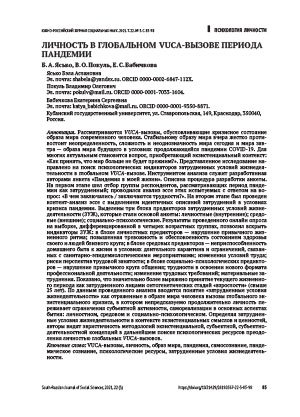Аннотация
Рассматриваются VUCA-вызовы, обусловливающие кризисное состояние образа мира современного человека. Стабильному образу мира вчера жестко противостоит неопределенность, сложность и неоднозначность мира сегодня и мира завтра — образа мира будущего в условиях продолжающейся пандемии COVID‑19. Для многих актуальным становится вопрос, приобретающий экзистенциальный контекст: «Как принять, что мир больше не будет прежним?». Представленное исследование направлено на поиск психологических индикаторов затрудненных условий жизнедеятельности в глобальном VUCA-вызове. Инструментом анализа служит разработанная авторами анкета «Пандемия в моей жизни». Описана процедура разработки анкеты. На первом этапе шел отбор группы респондентов, рассматривающих период пандемии как затрудненный; проводился анализ эссе этих испытуемых с ответом на вопрос: «В чем заключались / заключаются трудности?». На втором этапе был проведен контент-анализ эссе с выделением идентичных описаний затруднений в условиях кризиса пандемии. Выделены три блока предикторов затрудненных условий жизнедеятельности (ЗУЖ), которые стали основой анкеты: личностные (внутренние); средовые (внешние); социально-психологические. Результаты проведенного онлайн опроса на выборке, дифференцированной в четырех возрастных группах, позволил вскрыть индикаторы ЗУЖ: в блоке личностных предикторов — нарушение привычного жизненного ритма; повышенная тревожность и обеспокоенность состоянием здоровья своего и людей близкого круга; в блоке средовых предикторов — неприспособленность домашнего быта к жизни в условиях длительного карантина и ограничений, связанных с санитарно-эпидемиологическими мероприятиями; изменения условий труда; риски перспектив трудовой занятости; в блоке социально-психологических предикторов — нарушение привычного круга общения; трудности в освоении нового формата профессиональной деятельности; изменение трудовых требований; материальные затруднения. Показано, что значительно более выражено принятие текущего жизненного периода как затрудненного лицами онтогенетических стадий «взрослости» (свыше 25 лет). По данным проведенного анализа вводится понятие «затрудненные условия жизнедеятельности» как отраженные в образе мира человека вызовы глобального экзистенциального кризиса, в котором непредсказуемо продолжительно личность переживает ограничения субъектной активности, самореализации в основных аспектах бытия: личностном, средовом и социально-психологическом. Определяя затрудненные условия жизнедеятельности в контексте экзистенциальных смыслов и ценностей, авторы видят эвристичность методологий экзистенциальной, субъектной, субъектно-деятельностной концепций в дальнейшем поиске психологических ресурсов преодоления личностью глобальных VUCA-вызовов.
Ключевые слова
Библиографические ссылки
Johansen, R. (2012). Leaders Make the Future: Ten New Leadership Skills for an Uncertain World. San Francisco: Berrett-Koehler Publishers.
Klimov, Ye. A. (1995). Obraz mira v raznotipnykh professiyakh [The Image of the World in Different Types of Professions]. M.: Izd-vo Mosk. un-ta.
Kobasa, S. (1979). Stressful life Events, Personality and Health: An Inquiry into Hardness. Journal of Personality and Social Psychology, 37, 1–11.
Kobasa, S. (1984). The Hardy Executive: Health under Stress. Homewood (IL): Dow Jones-Irwin.
Leont’yev, A. N. (1975). Deyatel’nost’. Soznaniye. Lichnost’ [Activity. Consciousness. Personality]. M.: Izdatel’stvo politicheskoy literatury.
Leont’yev, D. A. (2020). Virazhi i mirazhi pandemicheskogo soznaniya: doklad [Turns and Mirages of Pandemic Consciousness: Report]. Psikhologicheskaya gazeta [Psychological Newspaper]. Retrieved from https://psy.su/feed/8337/
Leont’yev, D. A., Rasskazova, Ye. I. (2006). Test zhiznestoykosti [A Resilience Test]. M.: Smysl.
Maddi, S. (1998). Dispositional Hardiness in Health and Effectiveness. In H. S. Friedman (Ed.) Encyclopedia of Mental Health (pp. 323–335). San Diego (CA): Academic Press.
Maddi, S. R. (1997). The Personal Views Survey: A Measure of Dispositional Hardiness. Lanham, MD: Scarecrow Press.
Maddi, S. R., Kobasa, S. C. (1984). The Hardy Executive: Health Under Stress. Homewood, IL: Dow Jones-Irwin.
Maddi, S., Harvey, R. (2005). Hardiness Considered Across Cultures. In P. T.P. Wong, L.C.J. Wong (Eds) Handbook of Multicultural Perspectives on Stress and Coping (pp. 403–420). New York: Springer.
Mir VUCA i podkhody vyzhivaniya v nem [The World of VUCA and Approaches to Survival in It] (2020). Retrieved from http://becmology.ru/blog/management/vuca.htm
Nazar, J. (2020). 8 Critical Lessons Leaders Need to Emerge from the COVID-19 Crisis (And One that Will Surprise You). Fast Company. Retrieved from https://www.fastcompany.com/90502230/8-critical-lessons-leadersneed-to-emergefrom-the-covid-19-crisis-and-one-that-will-surpriseyou
Neustoychivyy VUCA-mir: kak prinyat’, chto zhizn’ bol’she ne budet prezhney [Unstable VUCA World: How to Accept That Life Will no Longer be the Same] (2020). RBK [RBK]. Retrieved from https://style.rbc.ru/life/5ef1ea139a79473c5be3e750
Noskova, O. G. (2021). Problemy psikhologii deyatel’nosti i yeye sub’’yekta v tvorchestve Ye. A. Klimova (k 90-letiyu so dnya rozhdeniya) [Problems of The Psychology of Activity and Its Subject in Creativity in The Works of E. A. Klimov (To The 90th Anniversary of The Birth)]. Psikhologicheskiy zhurnal [Psikhologicheskii Zhurnal], 2, 120–128.
Osukhova, N. G. (2012). Psikhologicheskaya pomoshch’ v trudnykh i ekstremal’nykh situatsiyakh [Psychological Assistance in Difficult and Extreme Situations]. M.: Izdatel’skiy tsentr “Akademiya”.
Poсul, V. O. (2021). Transformatsiya podkhodov k izucheniyu potrebitel’skogo povedeniya v realiyakh VUCA-mira [Transformation of Approaches to the Study of Consumer Behavior in the Realities of the VUCA world]. In Ekonomicheskoye razvitiye Rossii v usloviyakh pandemii: anatomiya samoizolyatsii, global’nyy lokdaun i onlayn budushcheye: materialy Mezhdunarodnoy nauchno-prakticheskoy konferentsii [Russia’s Economic Development in a Pandemic: The Anatomy of Self-isolation, Global Lockdown and the Online Future: Proceedings of the International Scientific and Practical Conference]. Krasnodar: Kubanskiy gos. un-t.
Serkin, V. P. (2006). Pyat’ opredeleniy ponyatiya “obraz mira” [Five Definitions of the Concept “Image of the World”]. Vestnik MGU. Psikhologiya [Bulletin of Moscow State University. Psychology], 1, 11–19.
Sorokoumova, G. V. (2018). Psikhologicheskiy trening kak effektivnyy metod razvitiya navykov, neobkhodimykh v XXI veke [Psychological Training as an Effective Method of Developing Skills Needed in the 21st Century]. Izdatel’skiy dom “Sreda” [Publishing House “Sreda”]. Retrieved from https://phsreda.com/e-articles/23/Action23–21963.pdf
Stolin, V. V., Naminach A. P. (1988). Psikhologicheskoye stroyeniye obraza mira i problemy novogo myshleniya [Psychological Structure of the Image of the World and Problems of New Thinking]. Voprosy psikhologii [Questions of Psychology], 4, 34–46.


